The Influence of Religion on Asylum Seeking
VerifiedAdded on 2020/03/01
|6
|1091
|301
Essay
AI Summary
This essay examines the significant role of religion in shaping the asylum-seeking approaches of individuals from various backgrounds. It discusses how religious beliefs can influence identity, community belonging, and the support systems available to asylum seekers. The paper highlights the differences in the role of religion in asylum processes in the USA compared to European contexts, emphasizing the need for further research in this area.
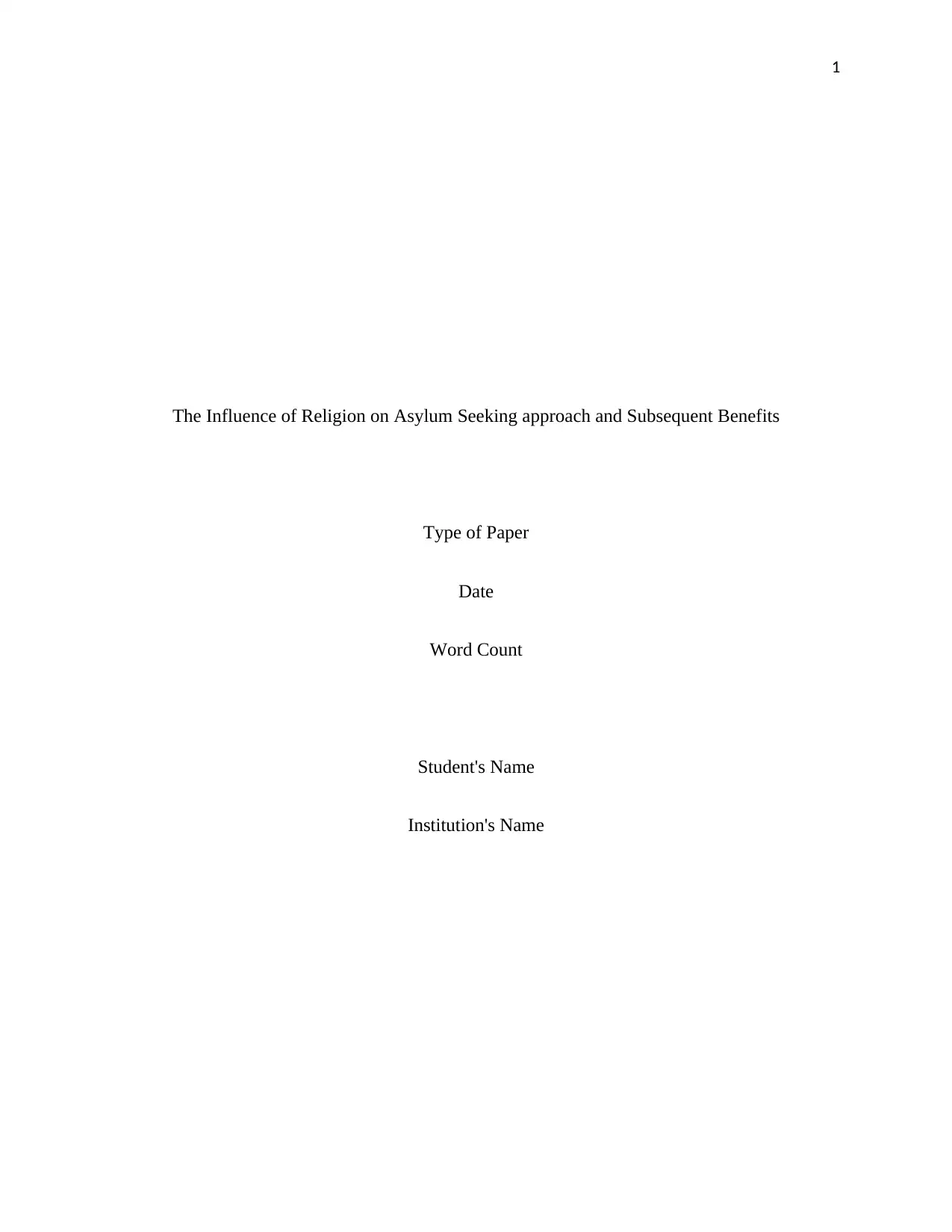
1
The Influence of Religion on Asylum Seeking approach and Subsequent Benefits
Type of Paper
Date
Word Count
Student's Name
Institution's Name
The Influence of Religion on Asylum Seeking approach and Subsequent Benefits
Type of Paper
Date
Word Count
Student's Name
Institution's Name
Paraphrase This Document
Need a fresh take? Get an instant paraphrase of this document with our AI Paraphraser
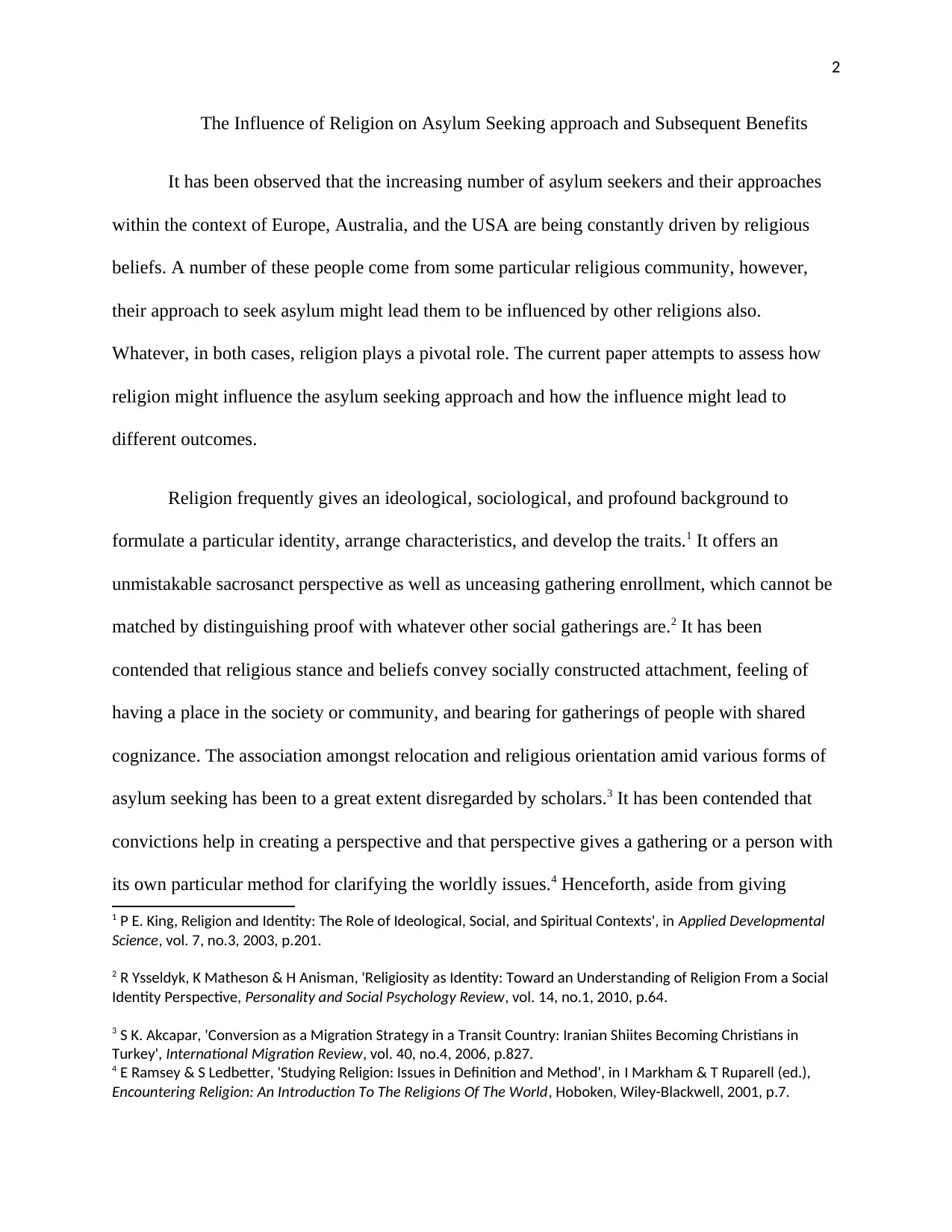
2
The Influence of Religion on Asylum Seeking approach and Subsequent Benefits
It has been observed that the increasing number of asylum seekers and their approaches
within the context of Europe, Australia, and the USA are being constantly driven by religious
beliefs. A number of these people come from some particular religious community, however,
their approach to seek asylum might lead them to be influenced by other religions also.
Whatever, in both cases, religion plays a pivotal role. The current paper attempts to assess how
religion might influence the asylum seeking approach and how the influence might lead to
different outcomes.
Religion frequently gives an ideological, sociological, and profound background to
formulate a particular identity, arrange characteristics, and develop the traits.1 It offers an
unmistakable sacrosanct perspective as well as unceasing gathering enrollment, which cannot be
matched by distinguishing proof with whatever other social gatherings are.2 It has been
contended that religious stance and beliefs convey socially constructed attachment, feeling of
having a place in the society or community, and bearing for gatherings of people with shared
cognizance. The association amongst relocation and religious orientation amid various forms of
asylum seeking has been to a great extent disregarded by scholars.3 It has been contended that
convictions help in creating a perspective and that perspective gives a gathering or a person with
its own particular method for clarifying the worldly issues.4 Henceforth, aside from giving
1 P E. King, Religion and Identity: The Role of Ideological, Social, and Spiritual Contexts', in Applied Developmental
Science, vol. 7, no.3, 2003, p.201.
2 R Ysseldyk, K Matheson & H Anisman, 'Religiosity as Identity: Toward an Understanding of Religion From a Social
Identity Perspective, Personality and Social Psychology Review, vol. 14, no.1, 2010, p.64.
3 S K. Akcapar, 'Conversion as a Migration Strategy in a Transit Country: Iranian Shiites Becoming Christians in
Turkey', International Migration Review, vol. 40, no.4, 2006, p.827.
4 E Ramsey & S Ledbetter, 'Studying Religion: Issues in Definition and Method', in I Markham & T Ruparell (ed.),
Encountering Religion: An Introduction To The Religions Of The World, Hoboken, Wiley-Blackwell, 2001, p.7.
The Influence of Religion on Asylum Seeking approach and Subsequent Benefits
It has been observed that the increasing number of asylum seekers and their approaches
within the context of Europe, Australia, and the USA are being constantly driven by religious
beliefs. A number of these people come from some particular religious community, however,
their approach to seek asylum might lead them to be influenced by other religions also.
Whatever, in both cases, religion plays a pivotal role. The current paper attempts to assess how
religion might influence the asylum seeking approach and how the influence might lead to
different outcomes.
Religion frequently gives an ideological, sociological, and profound background to
formulate a particular identity, arrange characteristics, and develop the traits.1 It offers an
unmistakable sacrosanct perspective as well as unceasing gathering enrollment, which cannot be
matched by distinguishing proof with whatever other social gatherings are.2 It has been
contended that religious stance and beliefs convey socially constructed attachment, feeling of
having a place in the society or community, and bearing for gatherings of people with shared
cognizance. The association amongst relocation and religious orientation amid various forms of
asylum seeking has been to a great extent disregarded by scholars.3 It has been contended that
convictions help in creating a perspective and that perspective gives a gathering or a person with
its own particular method for clarifying the worldly issues.4 Henceforth, aside from giving
1 P E. King, Religion and Identity: The Role of Ideological, Social, and Spiritual Contexts', in Applied Developmental
Science, vol. 7, no.3, 2003, p.201.
2 R Ysseldyk, K Matheson & H Anisman, 'Religiosity as Identity: Toward an Understanding of Religion From a Social
Identity Perspective, Personality and Social Psychology Review, vol. 14, no.1, 2010, p.64.
3 S K. Akcapar, 'Conversion as a Migration Strategy in a Transit Country: Iranian Shiites Becoming Christians in
Turkey', International Migration Review, vol. 40, no.4, 2006, p.827.
4 E Ramsey & S Ledbetter, 'Studying Religion: Issues in Definition and Method', in I Markham & T Ruparell (ed.),
Encountering Religion: An Introduction To The Religions Of The World, Hoboken, Wiley-Blackwell, 2001, p.7.
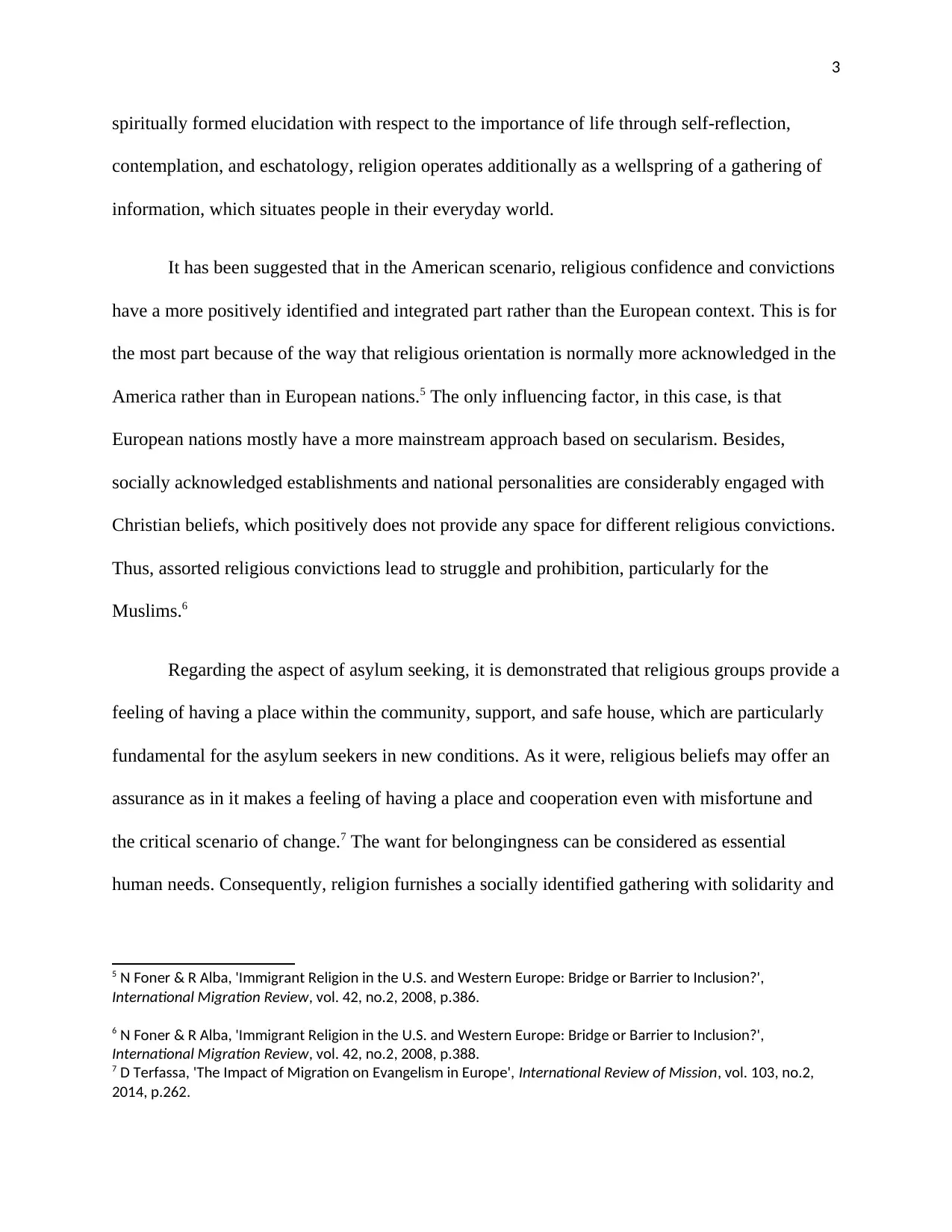
3
spiritually formed elucidation with respect to the importance of life through self-reflection,
contemplation, and eschatology, religion operates additionally as a wellspring of a gathering of
information, which situates people in their everyday world.
It has been suggested that in the American scenario, religious confidence and convictions
have a more positively identified and integrated part rather than the European context. This is for
the most part because of the way that religious orientation is normally more acknowledged in the
America rather than in European nations.5 The only influencing factor, in this case, is that
European nations mostly have a more mainstream approach based on secularism. Besides,
socially acknowledged establishments and national personalities are considerably engaged with
Christian beliefs, which positively does not provide any space for different religious convictions.
Thus, assorted religious convictions lead to struggle and prohibition, particularly for the
Muslims.6
Regarding the aspect of asylum seeking, it is demonstrated that religious groups provide a
feeling of having a place within the community, support, and safe house, which are particularly
fundamental for the asylum seekers in new conditions. As it were, religious beliefs may offer an
assurance as in it makes a feeling of having a place and cooperation even with misfortune and
the critical scenario of change.7 The want for belongingness can be considered as essential
human needs. Consequently, religion furnishes a socially identified gathering with solidarity and
5 N Foner & R Alba, 'Immigrant Religion in the U.S. and Western Europe: Bridge or Barrier to Inclusion?',
International Migration Review, vol. 42, no.2, 2008, p.386.
6 N Foner & R Alba, 'Immigrant Religion in the U.S. and Western Europe: Bridge or Barrier to Inclusion?',
International Migration Review, vol. 42, no.2, 2008, p.388.
7 D Terfassa, 'The Impact of Migration on Evangelism in Europe', International Review of Mission, vol. 103, no.2,
2014, p.262.
spiritually formed elucidation with respect to the importance of life through self-reflection,
contemplation, and eschatology, religion operates additionally as a wellspring of a gathering of
information, which situates people in their everyday world.
It has been suggested that in the American scenario, religious confidence and convictions
have a more positively identified and integrated part rather than the European context. This is for
the most part because of the way that religious orientation is normally more acknowledged in the
America rather than in European nations.5 The only influencing factor, in this case, is that
European nations mostly have a more mainstream approach based on secularism. Besides,
socially acknowledged establishments and national personalities are considerably engaged with
Christian beliefs, which positively does not provide any space for different religious convictions.
Thus, assorted religious convictions lead to struggle and prohibition, particularly for the
Muslims.6
Regarding the aspect of asylum seeking, it is demonstrated that religious groups provide a
feeling of having a place within the community, support, and safe house, which are particularly
fundamental for the asylum seekers in new conditions. As it were, religious beliefs may offer an
assurance as in it makes a feeling of having a place and cooperation even with misfortune and
the critical scenario of change.7 The want for belongingness can be considered as essential
human needs. Consequently, religion furnishes a socially identified gathering with solidarity and
5 N Foner & R Alba, 'Immigrant Religion in the U.S. and Western Europe: Bridge or Barrier to Inclusion?',
International Migration Review, vol. 42, no.2, 2008, p.386.
6 N Foner & R Alba, 'Immigrant Religion in the U.S. and Western Europe: Bridge or Barrier to Inclusion?',
International Migration Review, vol. 42, no.2, 2008, p.388.
7 D Terfassa, 'The Impact of Migration on Evangelism in Europe', International Review of Mission, vol. 103, no.2,
2014, p.262.
⊘ This is a preview!⊘
Do you want full access?
Subscribe today to unlock all pages.

Trusted by 1+ million students worldwide
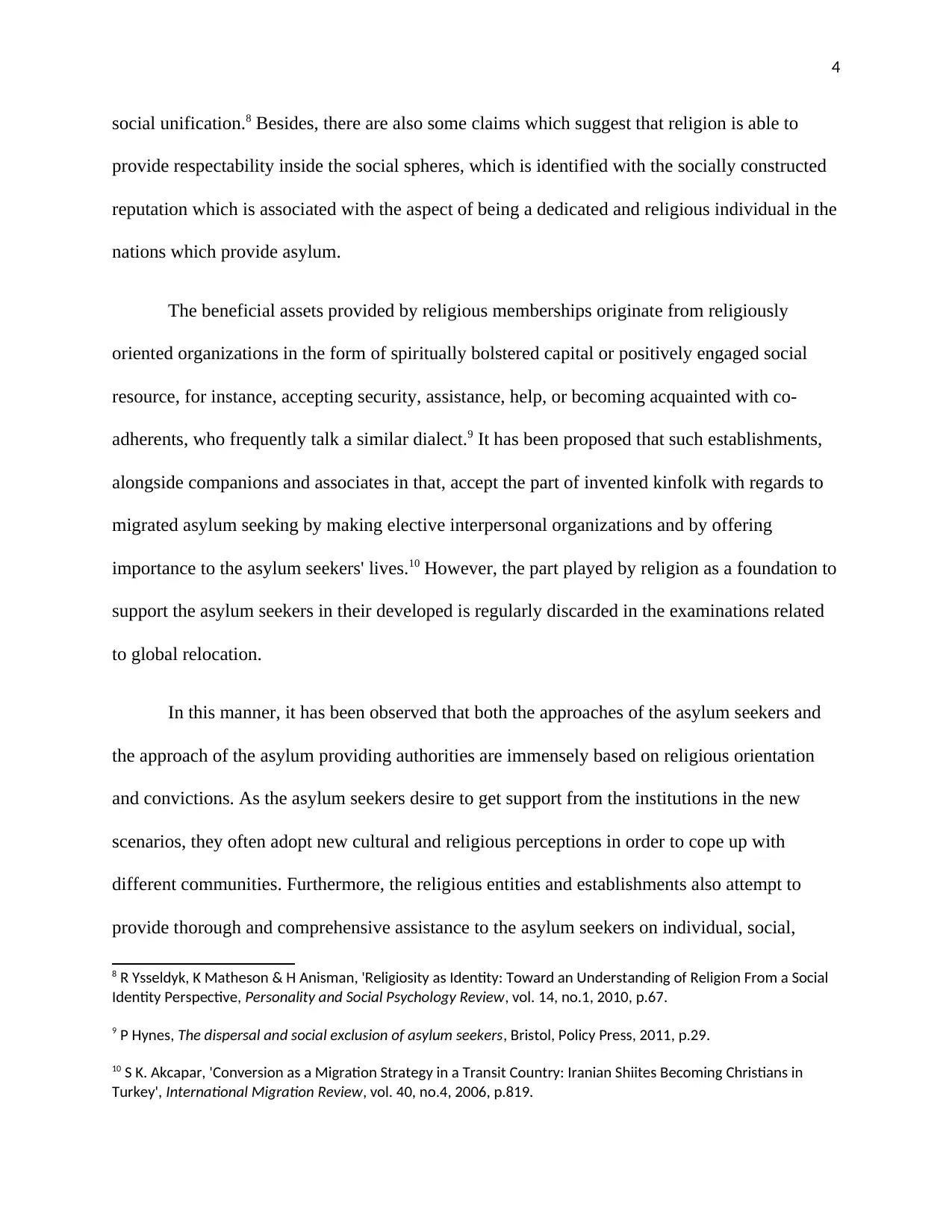
4
social unification.8 Besides, there are also some claims which suggest that religion is able to
provide respectability inside the social spheres, which is identified with the socially constructed
reputation which is associated with the aspect of being a dedicated and religious individual in the
nations which provide asylum.
The beneficial assets provided by religious memberships originate from religiously
oriented organizations in the form of spiritually bolstered capital or positively engaged social
resource, for instance, accepting security, assistance, help, or becoming acquainted with co-
adherents, who frequently talk a similar dialect.9 It has been proposed that such establishments,
alongside companions and associates in that, accept the part of invented kinfolk with regards to
migrated asylum seeking by making elective interpersonal organizations and by offering
importance to the asylum seekers' lives.10 However, the part played by religion as a foundation to
support the asylum seekers in their developed is regularly discarded in the examinations related
to global relocation.
In this manner, it has been observed that both the approaches of the asylum seekers and
the approach of the asylum providing authorities are immensely based on religious orientation
and convictions. As the asylum seekers desire to get support from the institutions in the new
scenarios, they often adopt new cultural and religious perceptions in order to cope up with
different communities. Furthermore, the religious entities and establishments also attempt to
provide thorough and comprehensive assistance to the asylum seekers on individual, social,
8 R Ysseldyk, K Matheson & H Anisman, 'Religiosity as Identity: Toward an Understanding of Religion From a Social
Identity Perspective, Personality and Social Psychology Review, vol. 14, no.1, 2010, p.67.
9 P Hynes, The dispersal and social exclusion of asylum seekers, Bristol, Policy Press, 2011, p.29.
10 S K. Akcapar, 'Conversion as a Migration Strategy in a Transit Country: Iranian Shiites Becoming Christians in
Turkey', International Migration Review, vol. 40, no.4, 2006, p.819.
social unification.8 Besides, there are also some claims which suggest that religion is able to
provide respectability inside the social spheres, which is identified with the socially constructed
reputation which is associated with the aspect of being a dedicated and religious individual in the
nations which provide asylum.
The beneficial assets provided by religious memberships originate from religiously
oriented organizations in the form of spiritually bolstered capital or positively engaged social
resource, for instance, accepting security, assistance, help, or becoming acquainted with co-
adherents, who frequently talk a similar dialect.9 It has been proposed that such establishments,
alongside companions and associates in that, accept the part of invented kinfolk with regards to
migrated asylum seeking by making elective interpersonal organizations and by offering
importance to the asylum seekers' lives.10 However, the part played by religion as a foundation to
support the asylum seekers in their developed is regularly discarded in the examinations related
to global relocation.
In this manner, it has been observed that both the approaches of the asylum seekers and
the approach of the asylum providing authorities are immensely based on religious orientation
and convictions. As the asylum seekers desire to get support from the institutions in the new
scenarios, they often adopt new cultural and religious perceptions in order to cope up with
different communities. Furthermore, the religious entities and establishments also attempt to
provide thorough and comprehensive assistance to the asylum seekers on individual, social,
8 R Ysseldyk, K Matheson & H Anisman, 'Religiosity as Identity: Toward an Understanding of Religion From a Social
Identity Perspective, Personality and Social Psychology Review, vol. 14, no.1, 2010, p.67.
9 P Hynes, The dispersal and social exclusion of asylum seekers, Bristol, Policy Press, 2011, p.29.
10 S K. Akcapar, 'Conversion as a Migration Strategy in a Transit Country: Iranian Shiites Becoming Christians in
Turkey', International Migration Review, vol. 40, no.4, 2006, p.819.
Paraphrase This Document
Need a fresh take? Get an instant paraphrase of this document with our AI Paraphraser
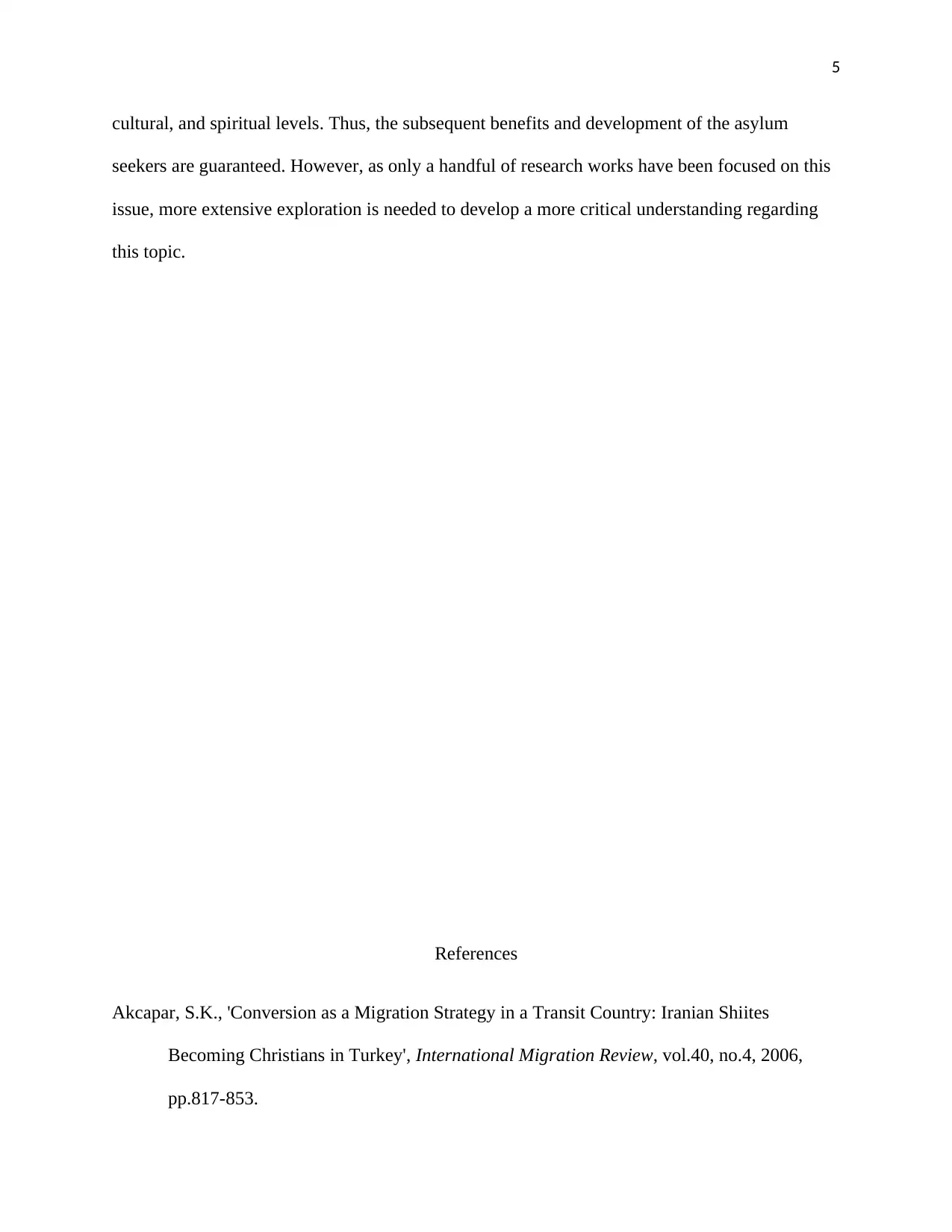
5
cultural, and spiritual levels. Thus, the subsequent benefits and development of the asylum
seekers are guaranteed. However, as only a handful of research works have been focused on this
issue, more extensive exploration is needed to develop a more critical understanding regarding
this topic.
References
Akcapar, S.K., 'Conversion as a Migration Strategy in a Transit Country: Iranian Shiites
Becoming Christians in Turkey', International Migration Review, vol.40, no.4, 2006,
pp.817-853.
cultural, and spiritual levels. Thus, the subsequent benefits and development of the asylum
seekers are guaranteed. However, as only a handful of research works have been focused on this
issue, more extensive exploration is needed to develop a more critical understanding regarding
this topic.
References
Akcapar, S.K., 'Conversion as a Migration Strategy in a Transit Country: Iranian Shiites
Becoming Christians in Turkey', International Migration Review, vol.40, no.4, 2006,
pp.817-853.
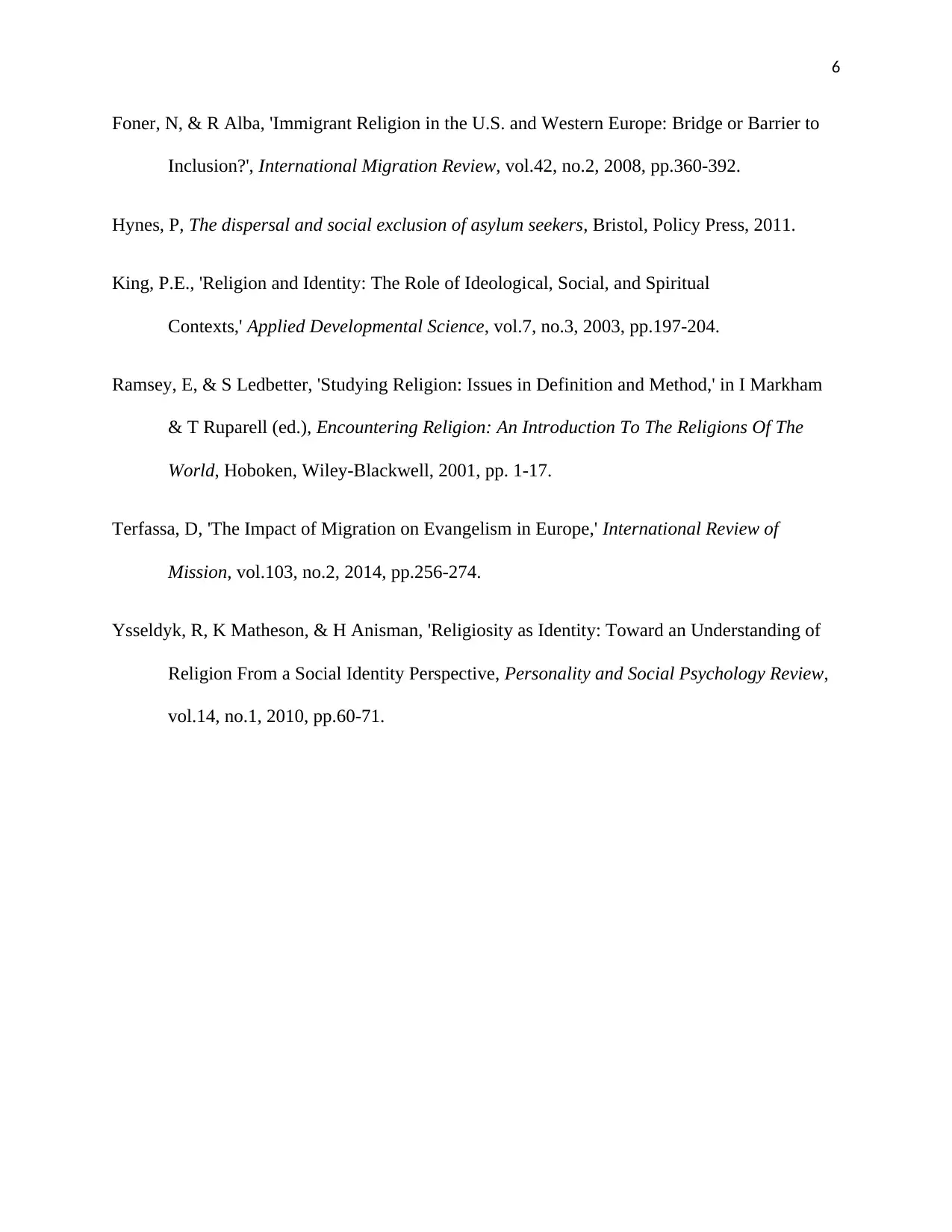
6
Foner, N, & R Alba, 'Immigrant Religion in the U.S. and Western Europe: Bridge or Barrier to
Inclusion?', International Migration Review, vol.42, no.2, 2008, pp.360-392.
Hynes, P, The dispersal and social exclusion of asylum seekers, Bristol, Policy Press, 2011.
King, P.E., 'Religion and Identity: The Role of Ideological, Social, and Spiritual
Contexts,' Applied Developmental Science, vol.7, no.3, 2003, pp.197-204.
Ramsey, E, & S Ledbetter, 'Studying Religion: Issues in Definition and Method,' in I Markham
& T Ruparell (ed.), Encountering Religion: An Introduction To The Religions Of The
World, Hoboken, Wiley-Blackwell, 2001, pp. 1-17.
Terfassa, D, 'The Impact of Migration on Evangelism in Europe,' International Review of
Mission, vol.103, no.2, 2014, pp.256-274.
Ysseldyk, R, K Matheson, & H Anisman, 'Religiosity as Identity: Toward an Understanding of
Religion From a Social Identity Perspective, Personality and Social Psychology Review,
vol.14, no.1, 2010, pp.60-71.
Foner, N, & R Alba, 'Immigrant Religion in the U.S. and Western Europe: Bridge or Barrier to
Inclusion?', International Migration Review, vol.42, no.2, 2008, pp.360-392.
Hynes, P, The dispersal and social exclusion of asylum seekers, Bristol, Policy Press, 2011.
King, P.E., 'Religion and Identity: The Role of Ideological, Social, and Spiritual
Contexts,' Applied Developmental Science, vol.7, no.3, 2003, pp.197-204.
Ramsey, E, & S Ledbetter, 'Studying Religion: Issues in Definition and Method,' in I Markham
& T Ruparell (ed.), Encountering Religion: An Introduction To The Religions Of The
World, Hoboken, Wiley-Blackwell, 2001, pp. 1-17.
Terfassa, D, 'The Impact of Migration on Evangelism in Europe,' International Review of
Mission, vol.103, no.2, 2014, pp.256-274.
Ysseldyk, R, K Matheson, & H Anisman, 'Religiosity as Identity: Toward an Understanding of
Religion From a Social Identity Perspective, Personality and Social Psychology Review,
vol.14, no.1, 2010, pp.60-71.
⊘ This is a preview!⊘
Do you want full access?
Subscribe today to unlock all pages.

Trusted by 1+ million students worldwide
1 out of 6
Your All-in-One AI-Powered Toolkit for Academic Success.
+13062052269
info@desklib.com
Available 24*7 on WhatsApp / Email
![[object Object]](/_next/static/media/star-bottom.7253800d.svg)
Unlock your academic potential
Copyright © 2020–2026 A2Z Services. All Rights Reserved. Developed and managed by ZUCOL.